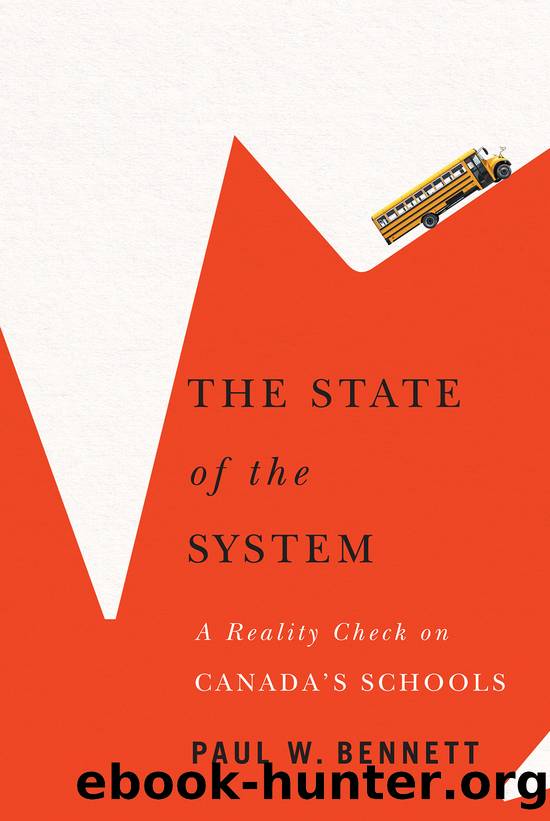The State of the System by Paul W. Bennett

Author:Paul W. Bennett
Language: eng
Format: epub
Publisher: McGill-Queen's University Press
Published: 2020-07-14T16:00:00+00:00
Figure 9.1 Annie Kidder and Ontario Education Minister Mitzie Hunter, 2017
Founder of People for Education Annie Kidder succeeded in promoting a new approach to student assessment, Measuring What Matters, consistent with her long-standing resistance to standardized testing. She reached the height of her influence from 2013 to 2018 and became a close confidante of successive Liberal Ministers of Education.
The Ontario student assessment initiative sprang, almost fully formed, from a different place. Over the twenty years of its existence, the Ontario-based People for Education advocacy organization had been a thorn in the side of Ontario’s student testing agency and a tenacious critic of its provincial achievement testing, focusing almost exclusively on literacy and mathematics. Originally a parent advocacy group lobbying for increased education funding, it had evolved by the 2000s into more of a policy advisory organization with close links to the Ontario Liberal governments of Dalton McGuinty and Kathleen Wynne.11 With the accession of Wynne to the premiership in January 2013, Kidder seized the opportunity to pursue the goal of broadening the existing measures of student success to embrace social-emotional skills or competencies.12 Making an explicit commitment to “move beyond the ‘3R’s’” and redefine the established testing/accountability framework, Kidder and her well-funded Toronto-centred research team began creating a “broad set of foundational skills” and developing a method of “measuring schools’ progress toward those goals.”13
The Ontario MWM advocates proposed a draft set of “Competencies and Skills” identified as Creativity, Citizenship, Social-Emotional Learning, and Health – all to be embedded in what were termed “quality learning environments” in both schools and the community.14 The proposed Ontario model made no reference whatsoever to cognitive learning and subject knowledge, nor to the social-emotional aspects of grit, perseverance, or work ethic. While it professed to be research-informed, the whole enterprise was driven by a team of Canadian education researchers with their own well-known hobby-horses.15 The co-chair of the MWM initiative, former BC Deputy Minister of Education Charles Ungerleider, assembled a group of academics with impeccable “progressive education” (anti-testing) credentials, including OISE teacher workload researcher Nina Bascia, Clinton, Shanker, Upitis, and Sears.
Two years into the project, the MWM student success framework had hardened into what began to sound more and more like a new catechism. The research director, David Hagen Cameron, a PhD in Education from the University of London, hired from the Ontario Ministry of Education, began to focus on how to implement the model with what he termed “MWM change theory.”16 His mandate was crystal clear – to take the theory and transform it into Ontario school practice in four years, then take it national in 2017–18. Five education researchers were recruited to write papers making the case for including each of the domains, some 78 educators were appointed to advisory committees, and the proposed measures were field-tested in 26 different public and Catholic separate schools (20 elementary, 6 secondary), representing a cross-section of urban and rural Ontario.
As an educational sociologist who cut his research teeth studying the British New Labour educational “interventionist machine,”
Download
This site does not store any files on its server. We only index and link to content provided by other sites. Please contact the content providers to delete copyright contents if any and email us, we'll remove relevant links or contents immediately.
| Anthropology | Archaeology |
| Philosophy | Politics & Government |
| Social Sciences | Sociology |
| Women's Studies |
The Secret History by Donna Tartt(16624)
The Social Justice Warrior Handbook by Lisa De Pasquale(11489)
Thirteen Reasons Why by Jay Asher(7788)
This Is How You Lose Her by Junot Diaz(5773)
Weapons of Math Destruction by Cathy O'Neil(5037)
Zero to One by Peter Thiel(4824)
The Myth of the Strong Leader by Archie Brown(4789)
Promise Me, Dad by Joe Biden(4447)
Beartown by Fredrik Backman(4419)
Stone's Rules by Roger Stone(4415)
How Democracies Die by Steven Levitsky & Daniel Ziblatt(4399)
The Fire Next Time by James Baldwin(4343)
100 Deadly Skills by Clint Emerson(4079)
A Higher Loyalty: Truth, Lies, and Leadership by James Comey(4033)
Rise and Kill First by Ronen Bergman(4012)
The David Icke Guide to the Global Conspiracy (and how to end it) by David Icke(3882)
The Farm by Tom Rob Smith(3872)
Secrecy World by Jake Bernstein(3782)
The Doomsday Machine by Daniel Ellsberg(3731)
